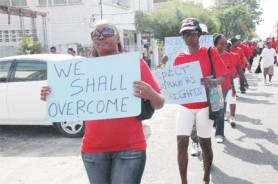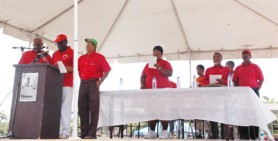The President of the Federa-tion of Independent Trade Unions of Guyana (FITUG) in his May Day address at a rally held yesterday at the National Park called for reconciliation among trade unions since it was the workers who were suffering.

The address by Carvil Duncan, who is also the General Secretary of the Guyana Labour Union, was at best given a lukewarm reception from a crowd, some of whose members were more intent on pursuing their own forms of entertainment in the stands, than on listening to speeches or reflecting on the state of trade unionism in Guyana.
Yesterday’s May Day observances were held under the theme ‘Responding to global challenges through trade union initiatives and solidarity.’ Also speaking at the rally was the President of the Guyana Agriculture Workers Union (GAWU) Komal Chand and Gaitri Baron, Chairperson of GAWU’s women’s forum.
In his address Duncan said that while May Day was traditionally a day “when we gyrate with joy as we reflect on our success as we plan for future success in the ensuing period,” he had to reluctantly confess “we [are] caught up in a crisis.”
While Duncan said that Guyana “is now in a better position than any other country in the Caribbean,” he called on the “administration” to address the matter of income tax and “the present threshold we now enjoy” since he believed it had “bogged down” the people.
“We’re finding it rather difficult when a person with no family at all and a person with a family of six still have to pay the same taxes,” Duncan said. He then called for a revision of the “mechanisms” which needed to be more receptive. A reduction in taxes he said, “would increase our real wages so that we can better sustain and maintain out real families.”
While he noted that the country was moving he questioned whether enough was being done to create jobs for persons. Now was the time, he continued, that a trade union movement should make demands.

Diverting from the subject of jobs and taxes, Duncan made a point of taking to task “union leaders who taking the time out to call FITUG all types of name.” He was not against criticism, he insisted, but “those who do it must first examine themselves.”
“FITUG is the most dynamic trade union organisation that this country has seen,” Duncan averred, while conceding that unions in the country were in “troubled times” since workers were refusing to join them and they needed more membership to make them vibrant and strong.
One way to combat the loss of workers from the unions, the FITUG President said, was to unify the trade union movement. “There needs to be some reconciliation and we need to behave like professionals. Sit down and talk in the best interest of the workers. It is necessary because it is not the leaders who are suffering it is you the workers. If the leaders do not want to get together if they do not want to have a united trade union, then we must take the union back,” Duncan concluded.
Meanwhile, echoing the call for reconciliation among trade unions was President of GAWU. Komal Chand in his address stated that “GAWU fully supports a united trade union movement and would like to see one trade union centre… speak with one voice on behalf of the workers in Guyana.”
While urging reconciliation between the GTUC and FITUG, he nevertheless called for the GTUC to recognise the strength of FITUG. “GAWU will play its role within FITUG to support reunification or collaboration,” he added.
Last year, regional trade union icon, Sir Leroy Trotman had mediated between the two union bodies in a bid to bring about a resolution but his efforts had proved futile and Chand said that FITUG could not be blamed for that failure.
Chand reiterated his call for unity among the unions “especially when employers want to bust unions.” When GAWU considers a matter important to receive its comments, it will do so as a matter of principle, he said. In a tacit reference to the bauxite dispute he went on, “We, therefore, reaffirm our support and solidarity to workers to belong to a union of their choice.”
While noting the perception that sugar workers were a favoured lot, he said it did not hold, and “GAWU know much differently.” He recognized, however, “that the Labour Minister’s laxity could also make our members victims one day.”
Sugar industry
Addressing issues relating specifically to the sugar industry, Chand blamed the “dismal performance” of that industry on neglect and poor management. He added that “the corporation continues to recycle the same worn-out excuses for the industry’s failures.”
The GAWU President also used the opportunity to again publicly denounce the three per cent wage increase awarded by the Gobind Ganga Arbitral Tribunal last December. “It was an act of spitefulness, we feel, because of the workers’ militancy and the stance of the union in defending its members,” he said.
He was far more accommodating of the President’s Low Carbon Development Strategy which he believed would be positive with benefits arising for all. He noted his union’s interest in the resolution of the Clico situation which he hoped would be cleared for liquidation by the next May Day so persons could secure their funds.
Gaitri Baron for her part told the rally that the voices of Guyanese women needed to be heard more loudly, and pointed out that today women made up a significant percentage of the work force compared to early times. She urged the government to do more to ensure that the “wealth” was distributed fairly.
The rally was attended by the Prime Minister who received a mixed welcome from those gathered in the stands. He did not give a speech but stayed for the duration of the rally.
May Day revellers?
While the trade union leaders on stage called for solidarity and reconciliation among the unions, those calls seemed to fall on inattentive ears. A number of the workers who marched in the traditional fashion under their union banners to the National Park seemed more interested in having a good time once they reached the tarmac than in listening to what any of the official speakers had to say.
The FITUG rally had a sizeable turnout – although it did not fill the stands – but some of the marchers could be seen drinking and carrying on their own discussions while the speeches were in progress. Neither Chand nor Duncan nor any of the other speakers yesterday managed to rouse the crowd with their presentations.
Duncan managed to get applause from a solitary worker when he began to speak, but was later unceremoniously asked to hurry up his address by hecklers because they were hungry, they shouted.
The only time the audience showed any excitement was during the entertainment breaks between the speeches. There was dancing on offer which was well received, but it was comedian Henry Rodney with some racy jokes unconnected to the occasion who had the crowd in uproar.
(Tiffny Rhodius)










